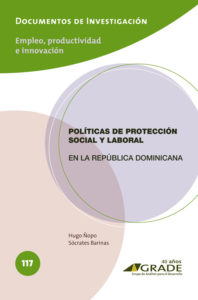Políticas de protección social y laboral en la República Dominicana
| Year | : | 2021 |
|---|---|---|
| Author/s | : | Hugo Ñopo, Sócrates Barinas |
| Area/s | : | Employment, productivity and innovation |
Ñopo, H. & Barinas, S. (2021). Políticas de protección social y laboral en la República Dominicana [Documento de Investigación, 117]. Lima: GRADE.
Social protection in the Dominican Republic results from a combination of social security programs in contributory and non-contributory modalities, labor regulations regarding job stability and minimum wages for a subset of workers, as well as anti-poverty programs. The contributions to the contributory modality and the costs of formal contracting vary according to the sector and size of the companies. However, the benefits that workers receive are lower than the costs, which creates incentives against the formalization and growth of companies. On the other hand, non-contributory programs subsidize informal employment. This policy mix discourages productivity and opportunities for Dominican workers to obtain higher-income jobs, which in turn places a significant burden on compensatory programs for poor families. Beyond good intentions, the overlap between contributory and non-contributory leads to a balance of low protection effectiveness, little redistribution, and low productivity. The solution to this problem must point to the focus of this, the labor legislation. This was imported from other realities many decades ago and, to a significant extent, is breached. Modernizing legislation is essential to strengthen social protection efforts and bring the economy into balance with greater social inclusion and shared progress.







